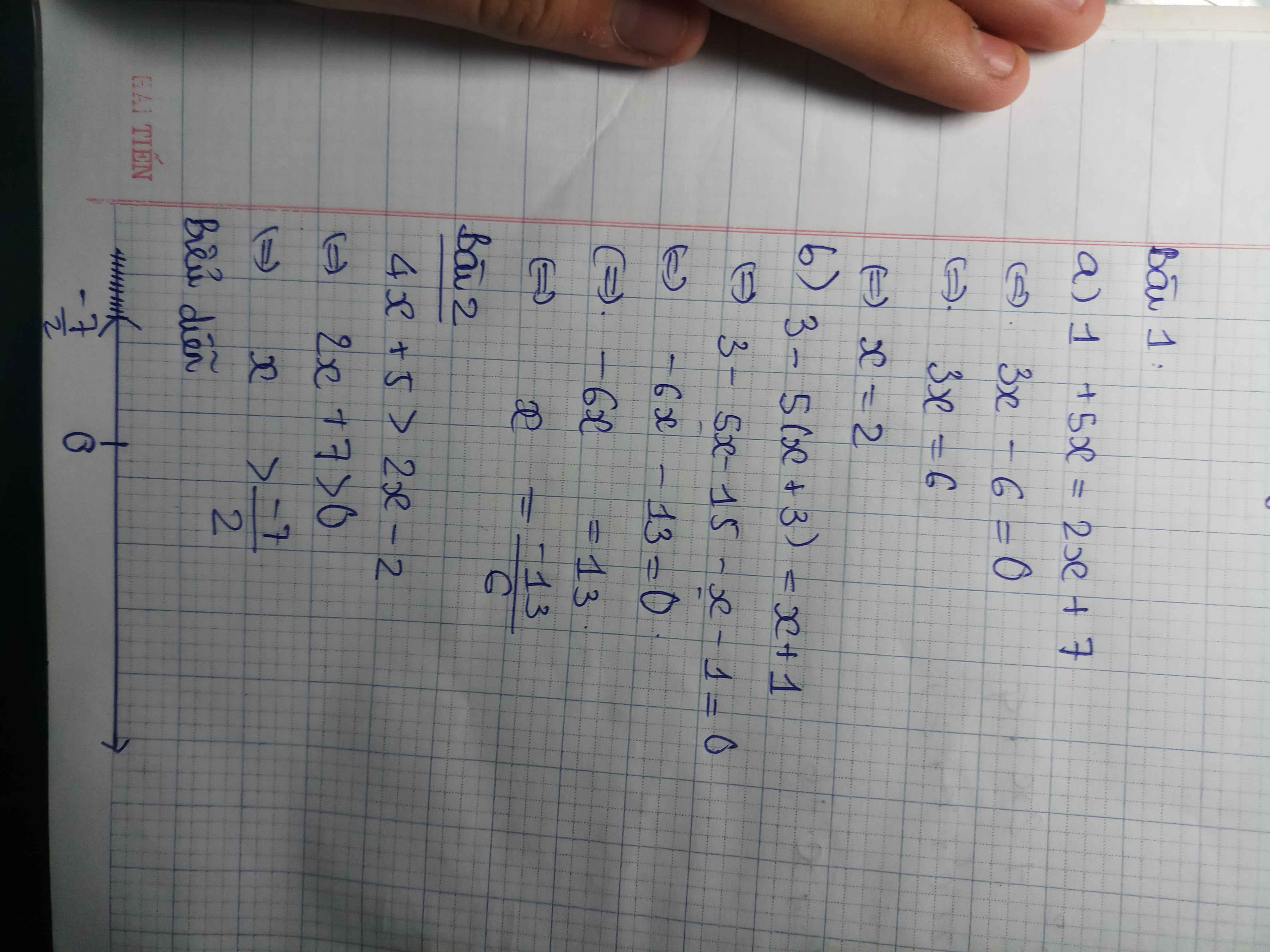Giải phương trình (x+5) √(2x+3)=-4x²+2x+54.

Những câu hỏi liên quan
Giải các phương trình sau:a)
2
+
x
−
5
4
4
x
−
1
6
;
b)
3
x
−
11
−
2
x
+
11
2018
;...
Đọc tiếp
Giải các phương trình sau:
a) 2 + x − 5 4 = 4 x − 1 6 ;
b) 3 x − 11 − 2 x + 11 = 2018 ;
c) 2 x − 5 = 7 − x ;
d) 2 x 2 − 1 x 3 + 1 + 1 x + 1 = 2 x 1 − x 2 − x x 2 − x + 1 .
a) Tìm được x = 2,2
b) Tìm được x = 2073
c) Tìm được x = 4 hoặc x = -2
d) Điều kiện x≠-1 . Tìm được x = 0 hoặc x = 3
Đúng 0
Bình luận (0)
Giải phương trình: 2x-1/5 - 4x/3 = 2x- x/10
\(\dfrac{2x-1}{5}-\dfrac{4x}{3}=2x-\dfrac{x}{10}\\ \Leftrightarrow\dfrac{6\left(2x-1\right)}{30}-\dfrac{40x}{30}=\dfrac{60x}{30}-\dfrac{3x}{30}\\ \Leftrightarrow12x-6-40x=60x-3x\\ \Leftrightarrow-28x-6=57x\\ \Leftrightarrow57x+28x+6=0\\ \Leftrightarrow85x=-6\\ \Leftrightarrow x=-\dfrac{6}{85}\)
Đúng 2
Bình luận (0)
1) Giải các phương trình sau : a) x-3/x=2-x-3/x+3 b) 3x^2-2x-16=0 2) Giải bất phương trình sau: 4x-3/4>3x-5/3-2x-7/12
\(a,\dfrac{x-3}{x}=\dfrac{x-3}{x+3}\)\(\left(đk:x\ne0,-3\right)\)
\(\Leftrightarrow\dfrac{x-3}{x}-\dfrac{x-3}{x+3}=0\)
\(\Leftrightarrow\dfrac{\left(x-3\right)\left(x+3\right)-x\left(x-3\right)}{x\left(x+3\right)}=0\)
\(\Leftrightarrow x^2-9-x^2+3x=0\)
\(\Leftrightarrow3x-9=0\)
\(\Leftrightarrow3x=9\)
\(\Leftrightarrow x=3\left(n\right)\)
Vậy \(S=\left\{3\right\}\)
Đúng 1
Bình luận (0)
\(b,\dfrac{4x-3}{4}>\dfrac{3x-5}{3}-\dfrac{2x-7}{12}\)
\(\Leftrightarrow\dfrac{4x-3}{4}-\dfrac{3x-5}{3}+\dfrac{2x-7}{12}>0\)
\(\Leftrightarrow\dfrac{3\left(4x-3\right)-4\left(3x-5\right)+2x-7}{12}>0\)
\(\Leftrightarrow12x-9-12x+20+2x-7>0\)
\(\Leftrightarrow2x+4>0\)
\(\Leftrightarrow2x>-4\)
\(\Leftrightarrow x>-2\)
Đúng 1
Bình luận (0)
Giải phương trình và bất phương trình
a) \(3\sqrt{-x^2+x+6}+2\left(2x-1\right)>0\)
b)\(\sqrt{2x^2+8x+5}+\sqrt{2x^2-4x+5}=6\sqrt{x}\)
a.
\(3\sqrt{-x^2+x+6}\ge2\left(1-2x\right)\)
\(\Leftrightarrow\left[{}\begin{matrix}\left\{{}\begin{matrix}-x^2+x+6\ge0\\1-2x< 0\end{matrix}\right.\\\left\{{}\begin{matrix}1-2x\ge0\\9\left(-x^2+x+6\right)\ge4\left(1-2x\right)^2\end{matrix}\right.\end{matrix}\right.\)
\(\Leftrightarrow\left[{}\begin{matrix}\left\{{}\begin{matrix}-2\le x\le3\\x>\dfrac{1}{2}\end{matrix}\right.\\\left\{{}\begin{matrix}x\le\dfrac{1}{2}\\25\left(x^2-x-2\right)\le0\end{matrix}\right.\end{matrix}\right.\)
\(\Leftrightarrow\left[{}\begin{matrix}\dfrac{1}{2}< x\le3\\\left\{{}\begin{matrix}x\le\dfrac{1}{2}\\-1\le x\le2\end{matrix}\right.\end{matrix}\right.\)
\(\Rightarrow-1\le x\le3\)
Đúng 0
Bình luận (0)
b.
ĐKXĐ: \(x\ge0\)
\(\Leftrightarrow\sqrt{2x^2+8x+5}-4\sqrt{x}+\sqrt{2x^2-4x+5}-2\sqrt{x}=0\)
\(\Leftrightarrow\dfrac{2x^2+8x+5-16x}{\sqrt{2x^2+8x+5}+4\sqrt{x}}+\dfrac{2x^2-4x+5-4x}{\sqrt{2x^2-4x+5}+2\sqrt{x}}=0\)
\(\Leftrightarrow\dfrac{2x^2-8x+5}{\sqrt{2x^2+8x+5}+4\sqrt{x}}+\dfrac{2x^2-8x+5}{\sqrt{2x^2-4x+5}+2\sqrt{x}}=0\)
\(\Leftrightarrow\left(2x^2-8x+5\right)\left(\dfrac{1}{\sqrt{2x^2+8x+5}+4\sqrt{x}}+\dfrac{1}{\sqrt{2x^2-4x+5}+2\sqrt{x}}\right)=0\)
\(\Leftrightarrow2x^2-8x+5=0\)
\(\Leftrightarrow x=\dfrac{4\pm\sqrt{6}}{2}\)
Đúng 0
Bình luận (0)
Câu b còn 1 cách giải nữa:
Với \(x=0\) không phải nghiệm
Với \(x>0\) , chia 2 vế cho \(\sqrt{x}\) ta được:
\(\sqrt{2x+8+\dfrac{5}{x}}+\sqrt{2x-4+\dfrac{5}{x}}=6\)
Đặt \(\sqrt{2x-4+\dfrac{5}{x}}=t>0\Leftrightarrow2x+8+\dfrac{5}{x}=t^2+12\)
Phương trình trở thành:
\(\sqrt{t^2+12}+t=6\)
\(\Leftrightarrow\sqrt{t^2+12}=6-t\)
\(\Leftrightarrow\left\{{}\begin{matrix}6-t\ge0\\t^2+12=\left(6-t\right)^2\end{matrix}\right.\)
\(\Leftrightarrow\left\{{}\begin{matrix}t\le6\\12t=24\end{matrix}\right.\)
\(\Rightarrow t=2\)
\(\Rightarrow\sqrt{2x-4+\dfrac{5}{x}}=2\)
\(\Leftrightarrow2x-4+\dfrac{5}{x}=4\)
\(\Rightarrow2x^2-8x+5=0\)
\(\Leftrightarrow...\)
Đúng 0
Bình luận (0)
Bài 1.*) Giải phương trình a) 1 + 5x 2x + 7 b) 3 – 5(x+3) x + 1 c) **) Giải bất phương trình và biểu diễn tập nghiệm trên trục số a) 4x + 5 2x – 2 b) 2 (x - 2) 5x + 2 (mũi tên kia thêm gạch ngang câub) giúp mình nha :))
Đọc tiếp
Bài 1.*) Giải phương trình
a) 1 + 5x = 2x + 7 b) 3 – 5(x+3) = x + 1 c)![]()
**) Giải bất phương trình và biểu diễn tập nghiệm trên trục số
a) 4x + 5 > 2x – 2 b) 2 (x - 2) < 5x + 2 (mũi tên kia thêm gạch ngang câub) giúp mình nha :))
bài 1 : Giải các phương trình sau: a/ 4x + 20 = 0
b/ 2x – 3 = 3(x – 1) + x + 2
bài 2 : Giải các phương trình sau: a/ (3x – 2)(4x + 5) = 0
b/ 2x(x – 3) – 5(x – 3) = 0
a/ 4x + 20 = 0
⇔4x = -20
⇔x = -5
Vậy phương trình có tập nghiệm S = {-5}
b/ 2x – 3 = 3(x – 1) + x + 2
⇔ 2x-3 = 3x -3+x+2
⇔2x – 3x = -3+2+3
⇔-2x = 2
⇔x = -1
Vậy phương trình có tập nghiệm S = {-1}
Đúng 0
Bình luận (0)
câu tiếp theo
a/ (3x – 2)(4x + 5) = 0
3x – 2 = 0 hoặc 4x + 5 = 0
3x – 2 = 0 => x = 3/24x + 5 = 0 => x = – 5/4Vậy phương trình có tập nghiệm S= {-5/4,3/2}
b/ 2x(x – 3) – 5(x – 3) = 0
=> (x – 3)(2x -5) = 0
=> x – 3 = 0 hoặc 2x – 5 = 0
* x – 3 = 0 => x = 3
* 2x – 5 = 0 => x = 5/2
Vậy phương trình có tập nghiệm S = {0, 5/2}
Đúng 0
Bình luận (0)
b1
a. 4x+ 20=0 <=> 4x= -20 <=> x= -20/4 <=> x= -5
b. 2x- 3= 3(x- 1)+ x+ 2 <=> 2x- 3= 3x- 3+ x+ 2
<=> 2x- 3= 4x- 1 <=> 2x- 4x= -1+ 3 <=> -2x= 2
<=> x= 2/-2 <=> x= -1
b2
a. (3x- 2)(4x+ 5)= 0
<=>\(\orbr{\begin{cases}3x-2=0\\4x+5=0\end{cases}\Leftrightarrow\orbr{\begin{cases}3x=2\\4x=-5\end{cases}}}\)
<=>\(\orbr{\begin{cases}x=\frac{2}{3}\\x=-\frac{5}{4}\end{cases}}\)
b. 2x(x- 3)- 5(x- 3)= 0
<=> (x- 3)(2x- 5)= 0
<=> \(\orbr{\begin{cases}x-3=0\\2x-5=0\end{cases}\Leftrightarrow}\orbr{\begin{cases}x=3\\2x=5\end{cases}}\)
<=> \(\orbr{\begin{cases}x=3\\x=\frac{5}{2}\end{cases}}\)
Đúng 0
Bình luận (0)
Giải các phương trình sau:
a)(x-2)x=2x(x+5)
b)(2x-5)(x+11)=(5-2x)(2x+1)
c)x^2+6x+9=4x^2
d)(x+2)(5-4x)=x^2+4x+4
a: \(\Leftrightarrow x\left(2x+10\right)-x\left(x-2\right)=0\)
=>x(2x+10-x+2)=0
=>x(x+12)=0
=>x=0 hoặc x=-12
b: \(\Leftrightarrow\left(2x-5\right)\left(x+11\right)+\left(2x-5\right)\left(2x+1\right)=0\)
=>(2x-5)(3x+12)=0
=>x=5/2 hoặc x=-4
c: \(\Leftrightarrow\left(2x\right)^2-\left(x+3\right)^2=0\)
=>(x-3)(3x+3)=0
=>x=3 hoặc x=-1
d: \(\Leftrightarrow\left(x+2\right)\left(5-4x\right)-\left(x+2\right)^2=0\)
\(\Leftrightarrow\left(x+2\right)\left(5-4x-x-2\right)=0\)
=>(x+2)(-5x+3)=0
=>x=-2 hoặc x=3/5
Đúng 2
Bình luận (0)
\(a,\left(x-2\right)x=2x\left(x+5\right)\)
\(\Leftrightarrow\left(x-2\right)x-2x\left(x+5\right)=0\)
\(\Leftrightarrow x.\left(x-2-2x-10\right)=0\)
\(\Leftrightarrow x\left(-x-12\right)=0\Leftrightarrow\left\{{}\begin{matrix}x=0\\x+12=0\end{matrix}\right.\Rightarrow\left\{{}\begin{matrix}x=0\\x=-12\end{matrix}\right.\)
Đúng 0
Bình luận (0)
Giải các bất phương trình, hệ phương trìnha) dfrac{x^2-4x+3}{2x-3}ge x-1b) 3x^2-left|4x^2+x-5right|3c)4x-left|2x^2-8x-15right|le-1d)x+3-sqrt{21-4x-x^2}ge0e)left{{}begin{matrix}xleft(x+5right) 4x+2left(2x-1right)left(x+3right)ge4xend{matrix}right.f)dfrac{1}{x^2-5x+4}ledfrac{1}{x^2-7x+10}
Đọc tiếp
Giải các bất phương trình, hệ phương trình
a) \(\dfrac{x^2-4x+3}{2x-3}\ge x-1\)
b) \(3x^2-\left|4x^2+x-5\right|>3\)
c)\(4x-\left|2x^2-8x-15\right|\le-1\)
d)\(x+3-\sqrt{21-4x-x^2}\ge0\)
e)\(\left\{{}\begin{matrix}x\left(x+5\right)< 4x+2\\\left(2x-1\right)\left(x+3\right)\ge4x\end{matrix}\right.\)
f)\(\dfrac{1}{x^2-5x+4}\le\dfrac{1}{x^2-7x+10}\)
giải các phương trình sau :
a, x^2 - 10x = -25
b, 4x^2 - 4x = -1
c, ( 1 - 2x )^2 = ( 3x - 2 )^2
d, ( x - 2 )^3 + ( 5 - 2x )^3 = 0
\(a,\Leftrightarrow\left(x-5\right)^2=0\Leftrightarrow x-5=0\Leftrightarrow x=5\\ b,\Leftrightarrow\left(2x-1\right)^2=0\Leftrightarrow2x-1=0\Leftrightarrow x=1\\ c,\Leftrightarrow\left(1-2x\right)^2-\left(3x-2\right)^2=0\\ \Leftrightarrow\left(1-2x-3x+2\right)\left(1-2x+3x-2\right)=0\\ \Leftrightarrow\left(3-5x\right)\left(x-1\right)=0\Leftrightarrow\left[{}\begin{matrix}x=1\\x=\dfrac{3}{5}\end{matrix}\right.\\ d,\Leftrightarrow\left(x-2\right)^3=-\left(5-2x\right)^3\\ \Leftrightarrow x-2=-\left(5-2x\right)=2x-5\\ \Leftrightarrow x=3\)
Đúng 0
Bình luận (0)
























